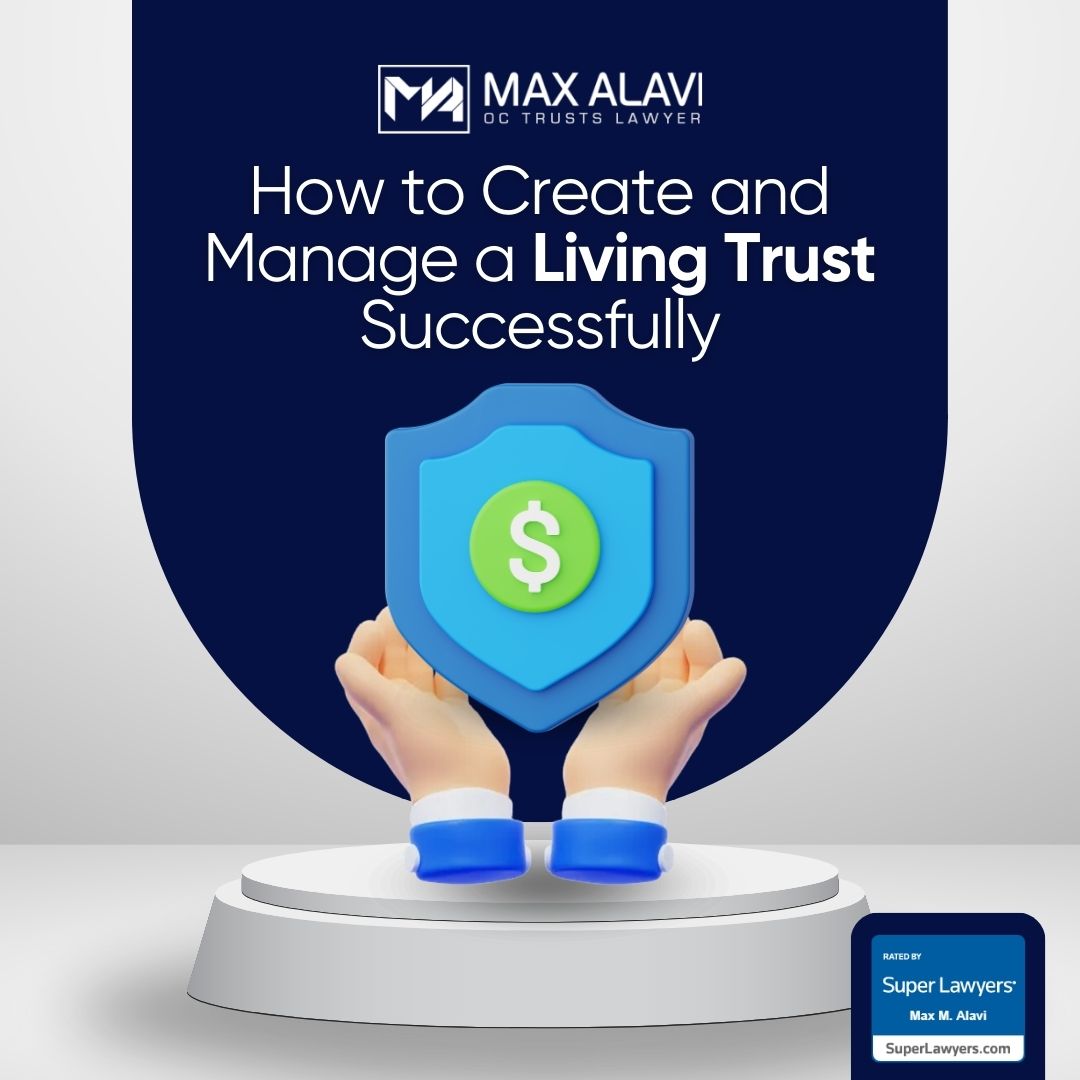Estate planning allows you to plan for the future, and to ensure your loved ones are taken care of after your death. One of the most essential estate planning documents is creating a living trust. But what are the benefits of a living trust? And what are the necessary steps for creating and maintaining one? Seek insights from Max Alavi APC, an estate planning and living attorney with a proven track record in the field of living trusts.
How to Create and Manage a Trust Successfully
No matter your age, no matter your income, and no matter your social standing, the future is always uncertain. None of us know exactly when and how we will die, nor what will become of our loved ones after we go. That’s what makes the estate planning process so important. Estate planning provides the legal framework by which we can ensure our assets are properly distributed after death, leaving our survivors with everything they need for their own security and peace of mind.
There are a number of important tools that can assist you in the estate planning process. One of the most important is the trust. A trust allows you to set aside assets and resources that are actively managed during your lifetime and distributed upon your death. Living trusts allow you to ensure that your estate is dealt with in a manner that is consistent with your wishes, and that promotes the best possible outcomes for your named heirs and beneficiaries.
What are the Benefits of a Trust?
Most trust and estate planning attorneys will tell you that having a living trust is paramount; simply putting together a will is insufficient for achieving your estate planning goals.
Consider just some of the benefits of the living trust:
- Avoiding probate. When you die with only a will in place, your estate is typically subject to the probate court. This involves a lot of costly and time-consuming legal processes for your heirs to deal with. A trust allows you to sidestep probate altogether.
- Ensuring Privacy. When your estate is taken up by the probate court, it usually means the contents of the estate are made public. So, by avoiding probate, a trust also helps you to maintain your privacy and confidentiality.
- Maintaining Control. Setting up a trust also gives you a lot of control over how your assets are distributed. For example, you can set up your trust so that minor beneficiaries only get their inheritance at a certain age, or after completing an undergraduate degree program.
How to Create a Living Trust
In order to take advantage of these benefits, we recommend working with a qualified estate planning lawyer, who can walk you through the ins and outs of trust creation. In brief, here is what that process entails.
Choose the Right Type of Trust
Generally, trusts fall into one of two categories: Revocable trusts and irrevocable trusts. The former can be changed, while the latter cannot. However, irrevocable trusts can also provide certain tax advantages that revocable trusts cannot.
Inventory Your Assets
You’ll need to name your assets to the trust in order for them to be included in your estate plan. Take the time to inventory your bank accounts, investment accounts, retirement accounts, real estate assets, and other personal properties carefully and comprehensively.
Decide on Beneficiaries
You’ll also need to devote some thought to the individuals you’d like to name as heirs and beneficiaries. Think about your spouse, children, grandchildren, and other loved ones.
Choose a Trustee
Your trustee has a fiduciary responsibility to the trust and is also tasked with administering your estate after you die. It’s critical to choose a trusted and responsible friend or family member. You might also name your personal financial planner or even your estate planning lawyer.
Create the Trust Document
Work with your trust lawyer to ensure all the relevant paperwork is completed and filed properly.
Fund Your Trust
Your trust lawyer can also guide you through the process of transferring assets out of your ownership and into the trust. Properly funding your trust is a critical part of the estate planning process.
Managing a Trust
There are also some important steps associated with managing your trust. Examples include:
Document Changes
Be diligent in keeping rigorous records of any changes made to the trust over time.
Update as Needed
Work with your estate planning lawyer to amend the terms of your trust any time your situation changes. Some reasons to update your trust include marriage, divorce, the birth of a child or grandchild, the adoption of a birth or grandchild, a death in the family, or a significant change in your financial status.
Communicate with Beneficiaries
Be clear and consistent in communicating with your named beneficiaries, minimizing the risk of surprise or conflict when the trust is administered.
Avoiding Common Estate Planning Pitfalls
Finally, ensure you’re steering clear of common trust errors and omissions. Some of the most common pitfalls include:
- Creating a trust but failing to properly fund it; without transferring assets into the trust, it effectively renders the trust null and void.
- Failing to update the trust, not accounting for new assets or changing family dynamics.
- Overlooking the importance of selecting a responsible and prudent trustee.
Get a Living Trust Consultation in Orange County
If you reside in Southern California and seek guidance on the benefits of a living trust or wish to establish one with a seasoned attorney, reach out to Max Alavi APC. With years of experience, a stellar track record, and accolades like being named a Super Lawyer, Max Alavi and his team at OC Trusts Lawyer are here to assist you. Contact us today for a complimentary initial consultation on living trusts!






